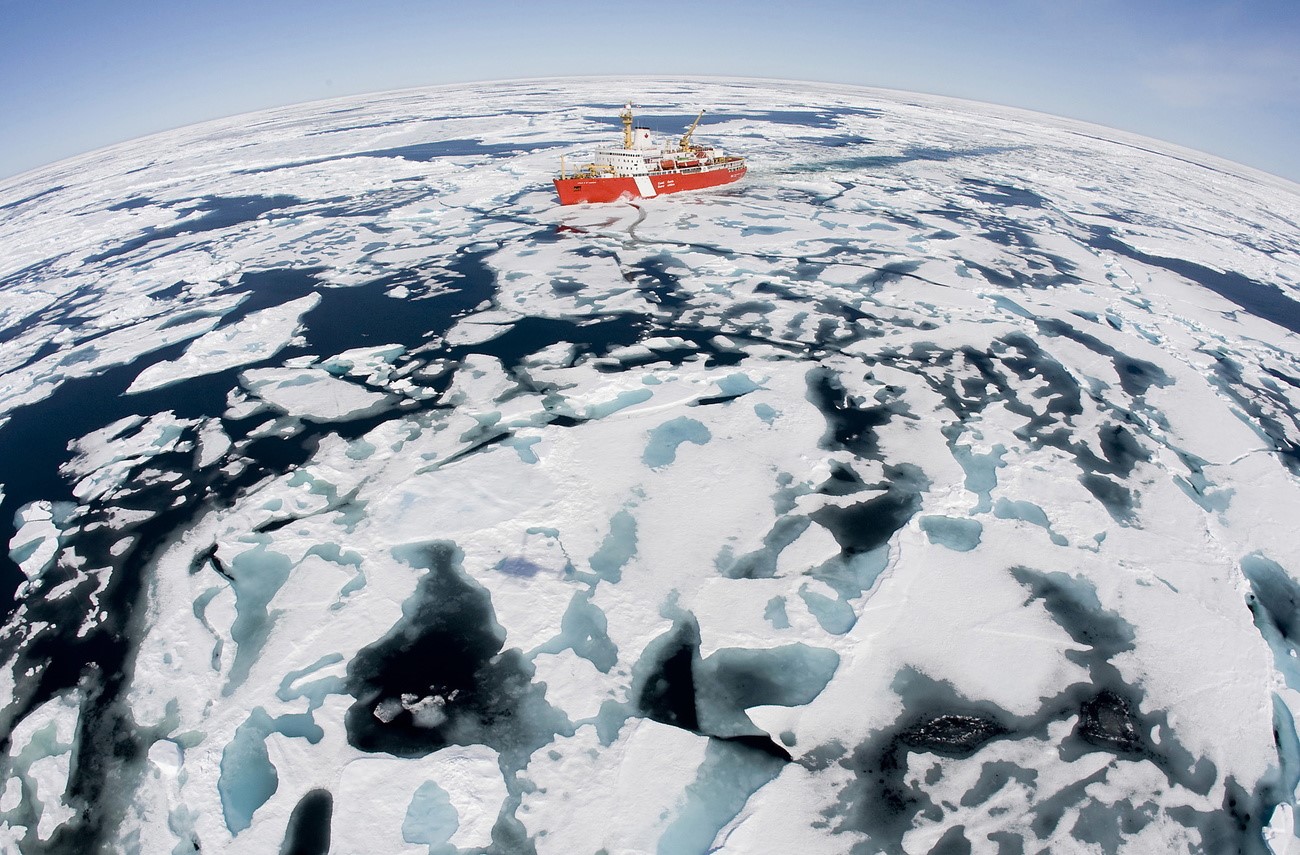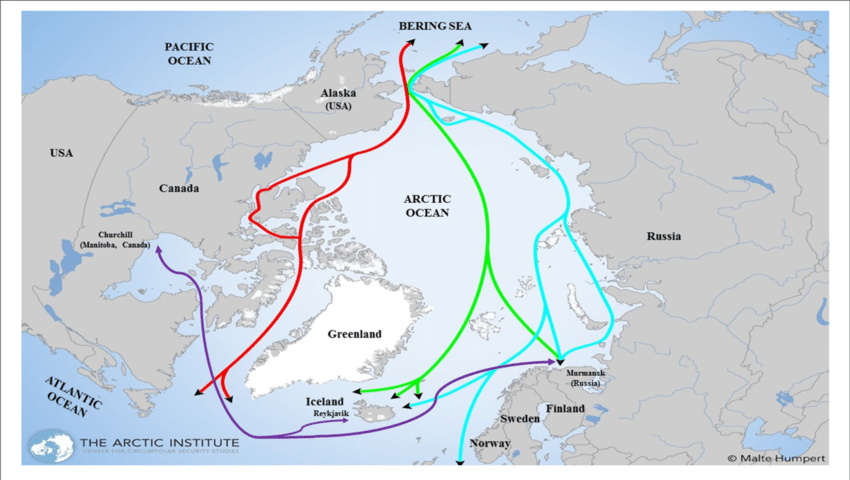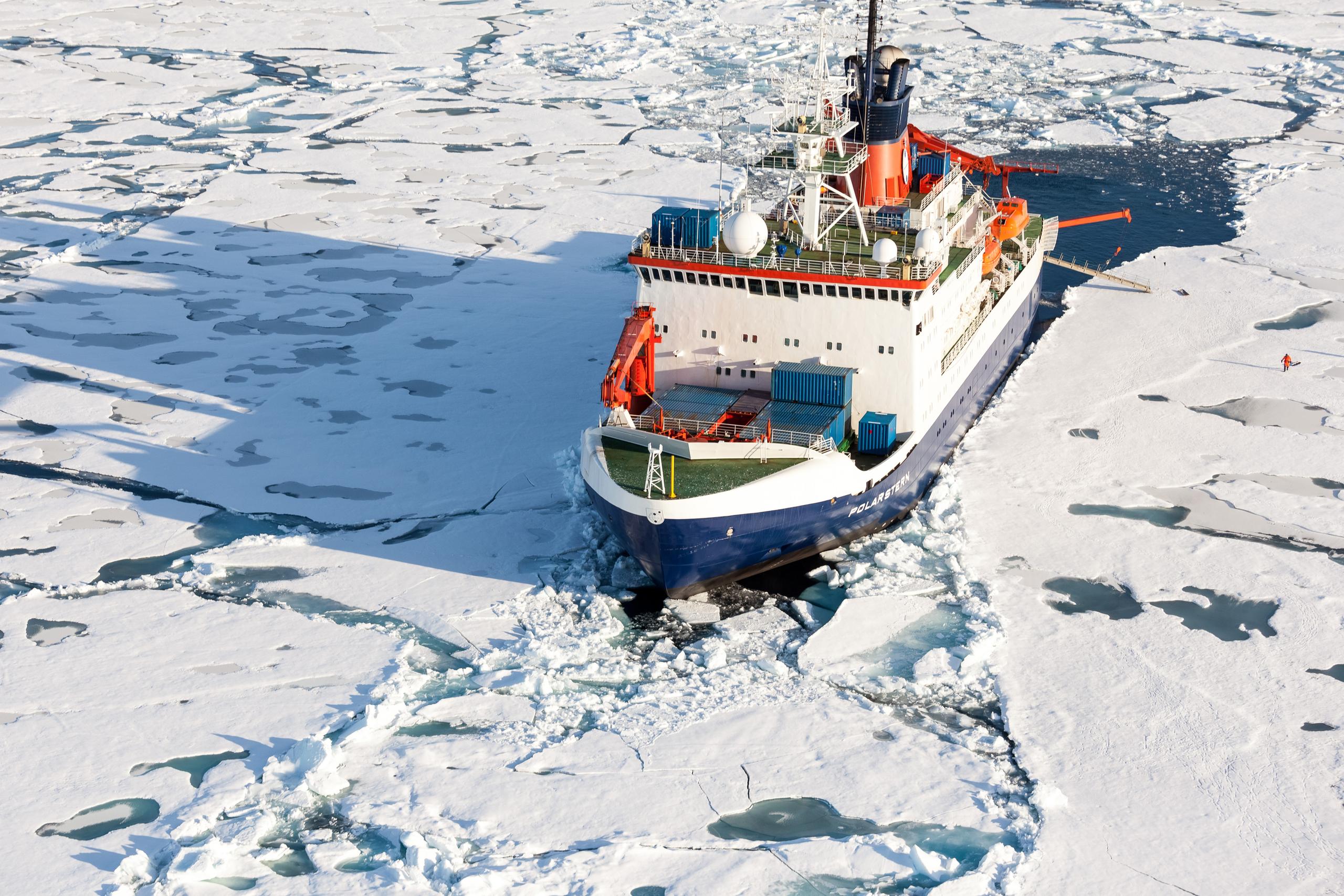
Switzerland has a role to play in the Arctic

The Arctic region is attracting more and more international attention. However, the race to the far north involves risks, notes Anna Stünzi, president of the Swiss think-tank foraus. She tells SWI swissinfo.ch how Switzerland can contribute to sustainable and peaceful development in the Arctic.
Every year the Arctic ice-cap loses an area the size of Austria. This is opening new commercial routes and arousing the appetite of major economic powers.
The Trump administration has approved oil drilling in a protected natural area in Alaska (although the concessions have now been blocked by a temporary moratorium decreed by Joe Biden), Russia has recently initiated the Vostok project, the most ambitious plan yet to exploit Arctic petroleum, while Canada and Norway have boosted their military presence in the region.
What is happening in the Arctic is important for Switzerland too, which may have a significant role to play in stabilising the region. In 2017, Switzerland became a member of the ArcticExternal link Council with observer status.
Anna Stünzi, is president of the foreign policy think-tank foraus, and a researcher at the Potsdam Institute for Climate Impact Research and co-author of a reportExternal link entitled “Switzerland and the Arctic”.
SWI swissinfo.ch: Why has the Artic become the focus of so many countries and multinationals?

Anna Stünzi: The Arctic is not just mountains of ice and polar desert. Four million people live above the Arctic circle. It’s also a very rich ecosystem with a high degree of biodiversity. It possesses abundant resources like copper, nickel, zinc and diamonds. The Arctic region is thought to contain 22% of the world’s reserves of petroleum and 30% of its reserves of gas.
The Arctic is becoming a region of geopolitical importance and has aroused the interest not only of countries in the region – Canada, Denmark, Norway, Russia, the US, Finland, Iceland and Sweden – but additional great powers like China.
The Arctic is one of the regions of the planet most affected by global warming; the ice is melting and that polar bears are threatened. How will changes in the Arctic affect our lives?
A.S.: Climate change in the Arctic threatens not only the native populations and fauna, but all of us. The Arctic permafrost is a huge natural storehouse of carbon. As it melts it releases greenhouse gases, which will accelerate global warming.
As regards to exploration and resource extraction, so far there has been a cooperative approach. But growing military and commercial activities in the region might bring escalation, with wide-ranging consequences. We need to prevent the Arctic becoming the theatre of current geopolitical rivalries, for example, between Russia and the West or the US and China, and ensure it stays a peaceful region where cooperation reigns.
With the melting of the ice-cap we could have more land, more energy resources and new commercial routes. Is this not all positive?
A.S.:Since 1979, the volume of the Arctic ice has shrunk by 75% and in summer it is now feasible to navigate from the Atlantic to the Pacific without needing an icebreaker. Some are speaking of a “new Suez canal” through the North Pole. For native people, this development and the growing interest in the region might create jobs, bring new economic activity and lead to extension of roads, railways, telecommunication networks and electrical grids.
However, new routes and easier access also mean risks for indigenous communities and already fragile ecosystems. Increased shipping may have a negative impact in terms of accidents and pollution. Given the difficult conditions there, rescue operations or cleanups of oil spills are not easy. The recent spill at Norilsk, in Siberia, shows that industrial accidents can have devastating effects on the environment and Arctic populations.

What does Switzerland have to do with the Arctic?
A.S.: Switzerland and the Arctic are closer than you might think. The highly globalised economy of Switzerland depends on the global commercial routes. Some interest groups might see in potential access to resources opportunities for Switzerland, which is a centre for trade in raw materials.
The current geopolitical antagonism in the Arctic represents a threat to the security of Europe and therefore also to Switzerland. Protection of the environment and human security are common global challenges.
We know that Switzerland is being affected by global warming more than other countries. Since it ratified the Paris climate agreement and signed up to the sustainable development goals [Agenda 2030 of the United Nations], it is its responsibility to follow what is happening in the Arctic. In 2017, Switzerland became a member of the ArcticExternal link Council with observer status, mainly due to its scientific know-how on Alpine and polar regions. Switzerland, with its strong Alpine identity, is sometimes described as a ‘vertical Arctic’. It has years of experience and a long tradition in the exploration of the cryosphere.
How has Switzerland contributed to discussions and decisions in the Arctic Council?
A.S.: The influence of a country with observer status is fairly limited. But Switzerland has good relations with all the member states of the Arctic Council and can raise significant issues bilaterally.
Swiss researchers are involved in three of the six working groups of the Council. For example, they are involved with protection of the Arctic marine environment and sustainable development.
What kind of Arctic would you like to see in the future?
A.S.: Commercial activity and regional development in the Arctic need to happen in conformity with the sustainable development goals and need to benefit local populations.
The Arctic needs to be an anchor of stability and an example of governance in the spirit of cooperation and multilateralism. Given that the prosperity and security of Switzerland depend on the international order working, we need to create mechanisms for peaceful resolution of crises and to limit military activity.
What can Switzerland actually do?
A.S.: It can act at various levels. In the first place, given our expertise in Alpine and glacial environments, it can promote the creation of a new working group centred on sustainable development of infrastructure.
Second, it can act using two institutional channels: within the Arctic Council and through the Organisation for Security and Cooperation in Europe. Having good relations with all the players in the Arctic, it could advocate the setting up of a regional security order by the OSCE, although at the moment the political context is not yet ripe for such an involvement.
Switzerland can provide its good offices facilitating peaceful resolution of conflicts and encouraging dialogue between governments, experts and civil society. Geneva as the international cooperation centre could organise meetings to have constructive dialogue on native populations, preserving cultural heritage and resource management.
Finally, in the area of scientific diplomacy, the Swiss government could promote a common declaration on the impact of climate change in the Arctic.
That said, it needs to be emphasised that Switzerland is still in the process of “discovering” the Arctic. The goal of our vision is to bring about discussions in the mid-to long-term and make the players more aware of the different options available.

More
Swiss scientists take part in unique polar research expedition

In compliance with the JTI standards
More: SWI swissinfo.ch certified by the Journalism Trust Initiative






























Join the conversation!